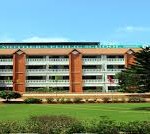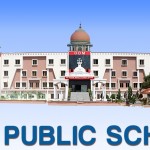
Stewart school, Cuttack has a tell-tale glorious past soaked in legends. Stewart School, Cuttack was founded by the enterprise and munificence of Dr. William Day Stewart, a Civil Surgeon based at Cuttack. In 1881, an urgent need for inception of an institution that would cater to the physical, social, intellectual and spiritual growth of the needy and destitute children of Europeans and Eurasians at Cuttack was sensed. To this effect, a meeting of European Community of Cuttack at the behest of Dr. Stewart, was held on 18th August 1882. As a result, the idea of an orphanage school was mooted and it took a concrete shape in November 1882. The orphanage school was an undenominational Protestant one and the Holy Bible served as the basis of moral teaching. In 1885, the orphanage school came to be known as the European school. The same year Dr. Stewart expressed his wish to be relieved of his duties as the Honorary Secretary. In 1888, a deed of gift was drawn up and Baptist Mission Society became the owner of the property. In 1891, the school was known as Protestant European School and the very same year the school was opened to Indian students. In 1910, the school was recognized as a Higher Elementary school by the Inspector of European Schools in Bihar and Orissa. In 1919, Secondary syllabus was adopted in the school. The school was re-christened as Stewart School in the afore-said year to perpetuate the name of its founder, Dr. William Day Stewart. In the year 1924, the school was confirmed in the status of Junior Secondary and the Cambridge Syndicate sanctioned the opening of a center for Cambridge Examinations in the school. In 1926, the school was upgraded to that of a Higher Secondary school. The expansion of school building was completed in 1937 and was inaugurated by his Excellency the Governor of Orissa on 6th January 1937 to meet the demands the exponential growth of the school. The reputation of the school spread far and wide attracting students even from remote regions of eastern India. The Stewart Science College was started on 1st July 1944 and both the school and the college functioned as a single unit for sometime. In 1948, separate managements were formed for the school and the college. In November 1948, N.C.C (Junior) was formed in the school. By this time, the fame of the school had reached unassailable heights. Its name had become synonymous with curricular and co-curricular excellence. In 1957, the Minister of Education, Orissa, impressed by the unblemished track record of Stewart School Cuttack, requested the Management to set up a school at Bhubaneswar. In the year 1960, the construction of the school building at Bhubaneswar began. In 1963, a new managing Committee was constituted for the smooth functioning of Stewart School at Bhubaneswar. In the year 1971, the reins of administration and management of Stewart Schools passed from Baptist Missionary Society on to the Diocese of Cuttack, Church of North India. In the year 1974, the school was affiliated to Council for Indian School Certificate Examinations, New Delhi. To commemorate the saga of hundred years of unparalleled service of Stewart School, Cuttack to humanity the foundation stone for a huge Centenary Hall was laid in 1982 and the construction was completed in 1996. At present, Stewart School, Cuttack is the only Anglo-Indian School in Orissa. Thus, an institution started as an orphanage school by a magnanimous soul has grown into a nonpareil institution, in a class all by itself. It is the lengthened shadow of its founder. Though it has crossed hundreds of milestones, its pilgrimage towards perfection is on and on .
“Fear of the LORD is the beginning of wisdom.” “Domini Timor Prima Sapientia.” This Biblical verse (Psalm 111:10) remains our guiding principle. (Here, fear stands for reverential awe of God, a reverence for His power and glory. In other words, it is a total acknowledgement of all that God is, which comes through knowing Him and all His attributes).
We firmly believe that God is omnipotent, omnipresent and omniscient. He is the source of all knowledge. Therefore, our mission is to inculcate in young minds that God is the ultimate source of all knowledge and He is the greatest teacher. Stewart School believes that every child is entitled to enjoy his/her childhood. They should be valued for their individuality, culture and heritage. They should be encouraged to develop their full potential in a stimulating and caring environment.
Our School Objectives
- To train young minds and mould character in such a way as to make young people socially compatible.
- To promote patriotism, national integration, international understanding and thus make the children global citizens.
- To imbibe the young minds with selflessness and fellow-feeling.
- To Inculcate respect for our culture and values and thus make them flag-bearers of our traditions.
- To make the process of education more interesting and less cumbersome through the use of modern technology.
- To give the children freedom to truly explore life.
- To Encourage independence and confidence.
We earnestly wish the children to take with them fond memories of their school days with us.
Our School Vision
To realize the vision of its founder i.e. to seek excellence not only in education but also widen the horizons of the young minds that would be adequately equipped intellectually, emotionally, morally and spiritually to embrace the challenges in future and ultimately to lead them to be excellent professionals, dedicated and enlightened leaders, great homemakers, and global citizens endowed with global understanding and above all, to be good human beings acknowledging the Lordship of our Creator.






